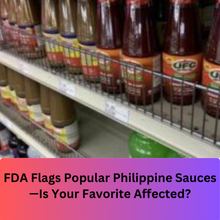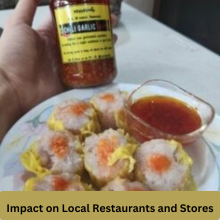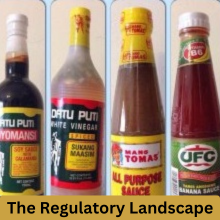
In late October 2024, the U.S. Food and Drug Administration (FDA) flagged several popular Philippine sauces, including beloved Filipino condiments like Jufran Banana Sauce and Mang Tomas All Purpose Sauce, for containing potentially harmful food additives. This has caused significant concern in Guam, where many local residents and businesses rely on these imported sauces. The FDA’s actions have created an uncertainty that’s affecting local distributors, restaurants, and consumers, sparking discussions about the impact of food regulations on island life. Let’s dive into the details behind the FDA’s Import Alert and how it’s shaking up the food scene on Guam.
What Happened? FDA Flags Popular Philippine Sauces
On October 25, 2024, the FDA issued an Import Alert (99-45) that listed several Filipino sauces as containing harmful food additives, including butylated hydroxyanisole (BHA) and potassium iodate. These chemicals have been associated with potential health risks, prompting the FDA to flag the products at U.S. borders for further inspection. This alert has raised questions about why these ingredients were flagged now, even though these sauces have been available in the U.S. for years.
The flagged products include widely used condiments in Filipino households, such as Jufran Banana Sauce, UFC Sweet Filipino Style Spaghetti Sauce, and Mang Tomas All Purpose Sauce. These products, commonly used for dishes like spaghetti, lechon (roast pig), and other Filipino favorites, are staples in local kitchens on Guam.
The Affected Products
The following products have been named in the FDA alert:
- Jufran Banana Sauce (Hot & Spicy, Regular)
- UFC Sweet Filipino Style Spaghetti Sauce
- Mang Tomas All Purpose Sauce (Regular & Hot & Spicy)
- UFC Sweet Chili Sauce
- Mother’s Best Hot All Purpose Sauce
- Kare Kare Stew Mix
- Andok’s Litson Sauce
These products are widely used in Filipino homes and restaurants across Guam, where Filipino culture is deeply intertwined with its cuisine. The sauces are essential for creating traditional dishes like sweet Filipino spaghetti, lechon, and other iconic meals.
Why Are These Additives Harmful?
To understand why the FDA flagged these sauces, it’s important to first look at the additives in question. BHA (Butylated Hydroxyanisole) is an antioxidant used to preserve fats and oils in food, but it has been linked to potential health risks, including cancer in animal studies. Potassium iodate, used as a dough conditioner and preservative in some products, has raised concerns about thyroid function and could be toxic if consumed in high quantities.
While the FDA’s warnings are based on precautionary measures, the fact that these ingredients are still allowed in some foods abroad has sparked confusion. The warning, however, is not an outright ban. Instead, flagged products are subject to additional scrutiny at U.S. ports, leading to delays or halts in their importation.
Guam’s Dependence on Imported Foods
Guam’s geographical location in the Pacific Ocean means that it has limited agricultural production, relying heavily on food imports. A large portion of the population on Guam, particularly those with Filipino heritage, depend on products imported from the Philippines to maintain their culinary traditions. For many, these sauces are not just condiments; they are essential ingredients that shape the flavor and authenticity of Filipino dishes.
As Jay Agabao, manager of Sky Guam Distributors Inc., explained, Guam’s food system is fragile because of its reliance on imports. Sky Guam is a major distributor of Philippine products, but with the FDA alert, they can no longer bring in these popular sauces without facing scrutiny.
How Does This FDA Alert Affect Distributors on Guam?
The impact of the FDA’s Import Alert has been felt by local distributors like Sky Guam Distributors. Agabao mentioned that they now have to inform clients that these specific sauces are no longer available for import. It’s a frustrating situation, especially when many clients rely on these products for both personal use and in their restaurants.
The need to comply with U.S. regulations has left many distributors in a tough spot. Even though the products haven’t been outright banned, the FDA’s decision to flag them means they face more hurdles at the border. Distributors are finding it challenging to meet consumer demand while ensuring compliance with U.S. food safety regulations.
Impact on Local Restaurants and Stores
Local businesses, especially family-owned restaurants and markets like Ben and Yan’s BBQ Place and Mini Mart, are feeling the pressure. These establishments, known for their Filipino dishes, have long relied on these sauces to give their meals an authentic taste. The sudden uncertainty around these products has disrupted their operations.
Neil Espino, the manager at Ben and Yan’s, expressed frustration over the situation, stating that it’s difficult to adapt quickly. “It’s definitely frustrating, and it really takes a big hit on the products,” he said. Without the ability to obtain these sauces, they are now forced to experiment with local alternatives, though the result isn’t always the same.
Espino hopes the situation will improve, but for now, it’s a matter of trial and error to find acceptable replacements that still capture the essence of Filipino cuisine.
Also read: Sweeten Your National Doughnut Day: Best SouthCoast Spots for Doughnuts
The Economic Implications of the FDA Alert
The financial toll on Guam’s local businesses is significant. Many restaurants and stores are being forced to source alternatives, which may not be as affordable or familiar to their customers. Additionally, local distributors are dealing with rising costs and logistical delays, which could increase the prices of other imported goods as well.
Small businesses, in particular, could be hit hard by these disruptions. As these businesses try to stay afloat by finding new suppliers, they must also cope with the loss of popular products, which could lead to a decline in sales.
Possible Solutions to the Supply Crisis
One possible solution to this supply crisis is for the U.S. to update its food safety regulations to better accommodate the needs of island communities like Guam. Agabao suggests that Guam’s unique position as a non-productive island should be considered in future food import regulations. By adjusting these rules, the FDA could make it easier for Guam to maintain access to culturally significant products without compromising safety.
Some advocates are calling for a review of these import rules, as they feel that the sudden enforcement of these standards is too harsh given that these products have been available for years without incident.
Public Reaction and Community Concerns
The Filipino community on Guam has expressed concern over the loss of these products, with many seeing this as an attack on their cultural identity. Foods like Jufran Banana Sauce and Mang Tomas have become integral to family gatherings and community events. For many, these sauces are more than just ingredients—they are a way to stay connected to their heritage.
The Regulatory Landscape
The FDA’s Import Alerts are part of the agency’s ongoing effort to ensure food safety in the U.S. While these alerts are based on health concerns, they can have far-reaching effects on consumers who depend on imported goods. Understanding how these regulations work and what they mean for food distribution can help businesses and consumers navigate the complexities of food imports.
Guam’s Food Industry: Challenges and Opportunities
While the FDA alert presents a significant challenge, it also offers an opportunity for Guam’s food industry to innovate. Local producers could step in to fill the gap left by the absence of these sauces. Moreover, the situation could lead to greater diversification in Guam’s food offerings, with local businesses experimenting with new recipes and alternatives.
What Happens Next for Affected Products?
The future of the affected products remains uncertain. Distributors are hoping for clarity on how to comply with FDA regulations and whether these products will eventually be allowed back into the market. For now, businesses are left to explore alternative suppliers or adjust their recipes to maintain customer satisfaction.
Also read: Mahomes Injured, But Chiefs Win OT Thriller vs. Bucs!
Conclusion
The FDA’s decision to flag popular Philippine sauces for harmful additives has sparked confusion and concern on Guam. While the alert has not resulted in an outright ban, the potential impact on local businesses, restaurants, and consumers cannot be underestimated. For the Filipino community on Guam, these sauces are more than just condiments—they are part of their cultural identity. Hopefully, a solution can be found that ensures both food safety and cultural preservation.
FAQs
-
What are BHA and potassium iodate, and why are they harmful?
- BHA is a preservative used in some foods, but it has been linked to health issues like cancer in animal studies. Potassium iodate is a chemical used in food processing that can affect thyroid function if consumed in large amounts.
-
Why has the FDA flagged these products now?
- The FDA’s decision was based on new research or concerns about the safety of certain ingredients used in these products, leading to their inclusion on the import alert list.
-
Will these sauces be banned permanently?
- Not necessarily. The FDA has not banned these products but has flagged them for further review. There may be updates or changes to the regulations in the future.
-
How are local businesses coping with the FDA’s actions?
- Many businesses are trying to adapt by sourcing alternative sauces or experimenting with locally available ingredients, though this can be challenging.
-
Could this affect the availability of other Filipino products on Guam?
- It’s possible that other products containing similar additives could be flagged in the future, leading to further disruptions in the supply of Filipino goods on Guam.

